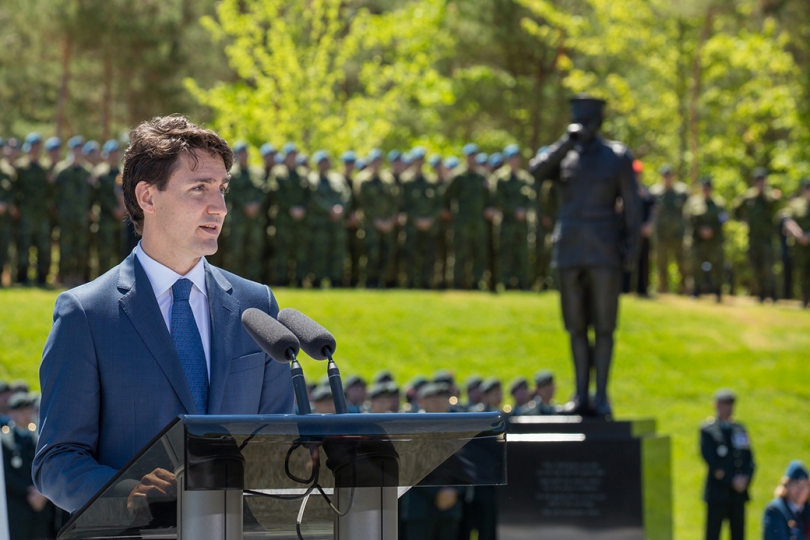Like this article? rabble is reader-supported journalism. Chip in to keep stories like these coming.
“And us in Afghanistan,” Craig Scott reminded me pointedly, responding to my recent column calling George W. Bush and Tony Blair war criminals. Don’t forget Canada’s shameful actions in Afghanistan, he was saying, when our own troops turned over captured Afghans to be tortured by others.
Craig Scott is a professor of constitutional and human rights law who became a first-rate but one-term MP, losing in last year’s anti-Harper sweep. He is now back as a law prof and has absolutely not given up on his many great causes. He is a tenacious, deeply knowledgeable adversary.
Despite the protracted Justin Trudeau honeymoon, the last year has already reminded us just how much easier it is to oppose than to govern. There’s a growing list of important Liberal Opposition commitments that the government is defaulting on: asbestos, arms to Saudi Arabia, Bill C-51 (the Conservatives’ anti-terrorism bill), electoral reform (now doubtful), the United Nations Declaration on the Rights of Indigenous People, and more.
For example, Prof. Scott adds fundamental moral questions related to war.
He argues that a pattern is developing of the Liberals emulating their Conservative predecessors. While they were in Opposition, he points out, the House of Commons adopted a resolution directing the government to convene a commission of inquiry into the torture of detainees in Afghanistan transferred by Canada to Afghans and Americans. It was a high-profile issue a decade ago and the Liberals joined the majority in supporting the resolution. But Prime Minister Stephen Harper refused a commission and the Liberal government has now followed suit.
Yet this remains a major issue for our time. For a government to send our troops into harm’s way is one thing. But in Afghanistan, Canadian soldiers handed over captured Afghans to Afghan allies knowing that they would likely be tortured. Sometimes Afghan prisoners were transferred to American agents who might well have tortured them directly.
That is something qualitatively different. That is a war crime.
Surely we need to know which Canadian officials were aware of this practice, who initiated it and why they failed to stop it.
The Liberals are well aware of the widespread interest in the commission of inquiry they once supported. Senior Liberals have openly recognized the seriousness of the matter while respected non-partisan Canadians are ratcheting up the public pressure. In a recent opinion piece in the Toronto Star, internationally recognized scholars William Schabas and Michael Byers argued, “We need to get at the truth, and we need to do so now.”
There’s the heart of the matter: the overwhelming evidence that Canada was indeed guilty of war crimes for the way our military treated Afghan prisoners. None of this was secret. Way back in 2006, Canada’s Louise Arbour, then serving as UN High Commissioner for Human Rights, reported that complaints of torture at the hands of Afghan officials were “common.” The Afghanistan Independent Human Rights Commission estimated that “one in three prisoners handed over by Canadians are beaten or even tortured.”
Canadian diplomat Richard Colvin, in Afghanistan, blew the whistle on this practice repeatedly. As Mr. Byers and Mr. Schabas observed, Mr. Colvin wrote 17 reports “that warned explicitly of torture and were distributed widely within the Departments of Foreign Affairs and National Defence.” He told a parliamentary committee that “for a year and a half after they [senior Canadian officials] knew about the very high risk of torture, they continued to order military police in the field to hand our detainees to the Afghan NDS [National Directorate of Security].”
In 2010, the excellent journalist Murray Brewster reported that one in five Afghan detainees interviewed by Canadian diplomats said they had been abused.
In response, the Conservatives veered from utter indifference to flagrantly dishonest denials tied to the shameless smearing of the courageous and admirable Mr. Colvin. Now, the Liberals, for reasons they have never explained, continue to follow the Conservatives’ lead.
This past June, the Rideau Institute issued an Open Letter to the Prime Minister urging “a commission of inquiry into Canada’s policies and practices relating to the transfer of hundreds of detainees to Afghan authorities.” Besides the institute’s president, Peggy Mason, herself a former Canadian ambassador, it was signed by three pages worth of eminent Canadians, including Conservatives Joe Clark and Ron Atkey, a number of prominent New Democrats, several former Canadian ambassadors, numerous academics and others with impressive reputations in the human-rights field.
So the Liberal government is being put on unmistakable notice that a decade later, this dark episode in Canadian life will not simply be forgotten. Liberals surely must know that neither Prof. Scott nor many of those who are demanding an inquiry are the kind to fade away quietly. Of course, it must be embarrassing to the government that these war crimes and atrocities against Afghan prisoners began under an earlier Liberal government. But is it too much to expect that politics not take precedence when international human rights are at stake?
The Prime Minister cannot expect the world to cheer any new Canadian involvement in peacekeeping operations when our military record contains the great scandal of Afghan detainees. To quote one Liberal MP from the party’s Opposition days:
“The international reputation of Canada and our military is at stake.” — Justin Trudeau, Nov. 29, 2009
Like this article? rabble is reader-supported journalism. Chip in to keep stories like these coming.
Image: PMO/Adam Scotti



